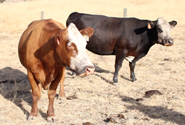
Photos by Roe Borunda / The Collegian
For the first time, the Rue and Gwen Gibson Farm Market at Fresno State is selling grass-fed beef raised off campus on the San Joaquin Experimental Range.
Grass-fed beef is growing in popularity as an alternative to conventionally fed beef and has many benefits.
Cattle that are raised on a grass-fed diet are not given hormones or antibiotics.
John Henson, professor of meat sciences, oversees the meats lab enterprise, which produces all the fresh meat cuts and processed products of the farm market and a few local restaurants.
“Grass-fed beef is leaner, typically, than conventionally fed beef just because of the types of feeds that they’re consuming, and I think people feel that it’s maybe more environmentally sound in terms of a renewable resource,” Henson said.
“Grass is obviously a renewable resource that’s here for us to take advantage of,” Henson said.
A full line of processed meat products and fresh cuts of pork, beef and lamb are raised on the farm on campus.
The experimental range is located off campus, north of Fresno in Coarsegold. Around 100 Fresno State cattle meander the pastures feeding on the grass and a special molasses blend rich with nutrients and protein before being sent to the Fresno State campus.
The experimental ranch begins calving at the end of October to the beginning of December. The calves are then branded with the Fresno State brand and will stay with their mothers until the end of May.
“We’ll pull some off, and they’ll be taken down to the beef unit on campus and go on regular grass because up here, the grass starts drying out to where there’s no minerals to them, it’s just filler,” Suniga said.
The cattle are then given green grass rich with nutrients such as protein before the slaughter for the summer.
There are 267 acres of land that cattle have to graze on at the experimental range. All the cattle on the range are used for beef; milking is done at the dairy on campus.
“They are brought down to the beef unit just prior to coming over to the meats lab for harvest and processing, but the entire time they are on a grass diet,” Henson said.
Anthony Suniga is a Fresno State graduate and now works on the experimental range.
“It’s almost like a natural raising things, that’s all grass,” Anthony Suniga said. “It’s basically all beef so people think it’s healthier for them — which it is.”
“There are a lot of people who support agriculture. Not just in the school, but in the community,” Suniga said. “There are a lot of things happening in the ag department, like the Foster Farms facility.”
The students who work at the meats lab are all employees of the university and they use it as on-the-job training for their future in the meats industry, Henson said.
“Our facility is 100 percent student-run,” Henson said. “We have student business managers, student production managers and student employees that harvest and process all the various products that you’ll find at the farm market.”
Grass-fed beef was marketed over the summer for the barbecue season, and it was highly successful, Henson said.
Conventionally fed beef tastes slightly different. A grain finished calf will be a little bit sweeter compared to a grass-fed calf, Suniga said.
“I don’t think that it’ll ever overcome the popularity of conventionally fed beef,” Henson said. “It’s more of a niche product, but we’re obviously going to continue with the project in the future and hopefully grow it a little bit so we can offer that to the public.”





